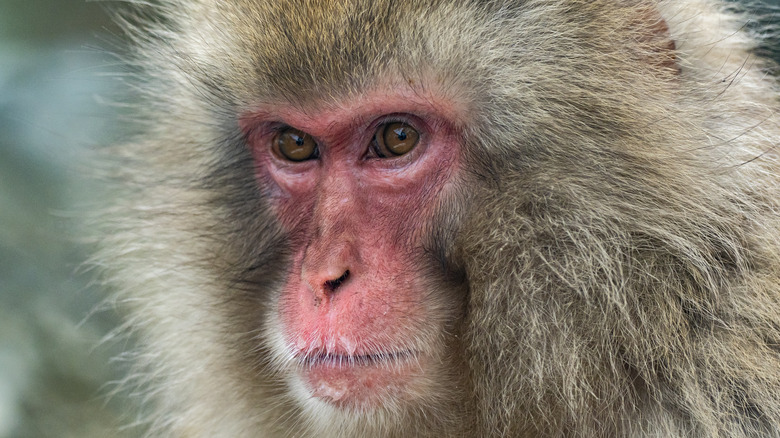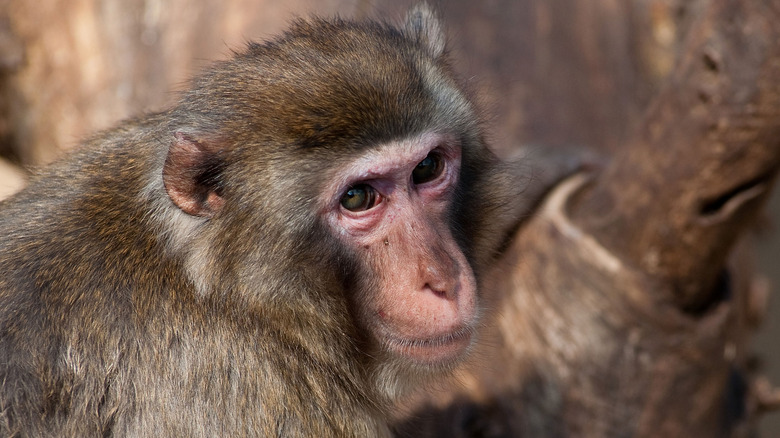Inside The Monkey Attacks Plaguing Japan
Wild macaque monkeys have long been a symbol of Japan, but in recent years their relationship with the country's human citizens has reached crisis point. In April 2021, the wildlife management and mammalian ecology expert Hiroto Enari published a paper in the journal Mammal Study titled "Human-Macaque Conflicts in Shrinking Communities: Recent Achievements and Challenges in Problem Solving in Modern Japan." Enari notes that the Japanese macaque population has undergone a huge resurgence in recent decades, a result of conservation efforts in the years following World War II coupled with Japan engaging only in limited deforestation, in comparison to the previous century. Today, Japan's macaque population is at the highest it has been since the 1800s.
However, the dramatic increase in Japan's macaque population over the years has, according to Enari, "rarely been considered a conservation success." Enari explains how the resurgence has led to severe conflicts between humans and macaques, most notably in widespread crop damage in regions with high macaque populations, leading to the necessity of culls. And since Enari's paper was published, conflicts have only intensified, as a spate of reports coming from the southwestern city of Yamaguchi in the summer of 2022 made clear.
As reported in many major news outlets, including The New York Times, throughout July Yamaguchi saw a spate of macaque-on-human attacks, with 56 people experiencing violent encounters with the primates. "All of Yamaguchi city is surrounded by mountains and it's not rare to see monkeys ... But it's rare to see this many attacks in a short period of time," an agricultural official told The Guardian.
Break-ins, baby snatchings, and sneak attacks
A father in Yamaguchi shared the story of one especially horrifying macaque attack. The Mainichi Shimbun daily newspaper said that the father recalled how he was upstairs in his home when he heard the sound of cries from the ground floor. "I hurried down ... Then I saw a monkey hunching over my child" (via The Guardian).
Some reports, including an Associated Press story posted by The Rafu Shimpo, allege that several of the attacks have been attempted baby snatchings, as well as attacks on people in their sleep, with macaques creeping into people's homes through doors and windows left open to deal with Japan's exceptionally hot summer. "Initially, only children and women were attacked. Recently, elderly people and adult men have been targeted, too," one Yamaguchi official told The Guardian, while another, Masato Saito, explained: "They are so smart, and they tend to sneak up and attack from behind, often grabbing at your legs" (via The Rafu Shimpo).
Thankfully, however, the majority of injuries so far have been minor, as The Guardian reports. Nevertheless, the unusually high frequency of attacks in the region has meant that officials have had to take action.
How many macaques are responsible?
Early attempts by Yamaguchi authorities included the use of tranquilizer guns to incapacitate individual macaques that have been identified as especially aggressive toward humans in the city. As another article from The Guardian notes, in the early days of July it was still unknown how many primates were responsible for the attacks.
As attacks continued, Yamaguchi residents were advised to remain indoors as much as possible and to keep their doors and windows shut despite the hot weather, as officially commissioned hunters patrolled the local area. On Wednesday, July 27, it was reported via the same source that one 4-year-old, three-foot-tall macaque had been identified as an attacker. The monkey was captured and later euthanized.
However, per the same source, locals have reported confrontations with primates of other sizes and ages, meaning that it is likely that the recent attacks have been the work of more than one of the city's macaques. And with each attack, the macaques' behavior is likely to get worse, with Hiroto Enari telling The New York Times that if the attacks are not stopped the primates can learn techniques over time for damaging property and terrorizing citizens: "(I)f humans give them many opportunities to learn, they might cause more conflict," he explained.

